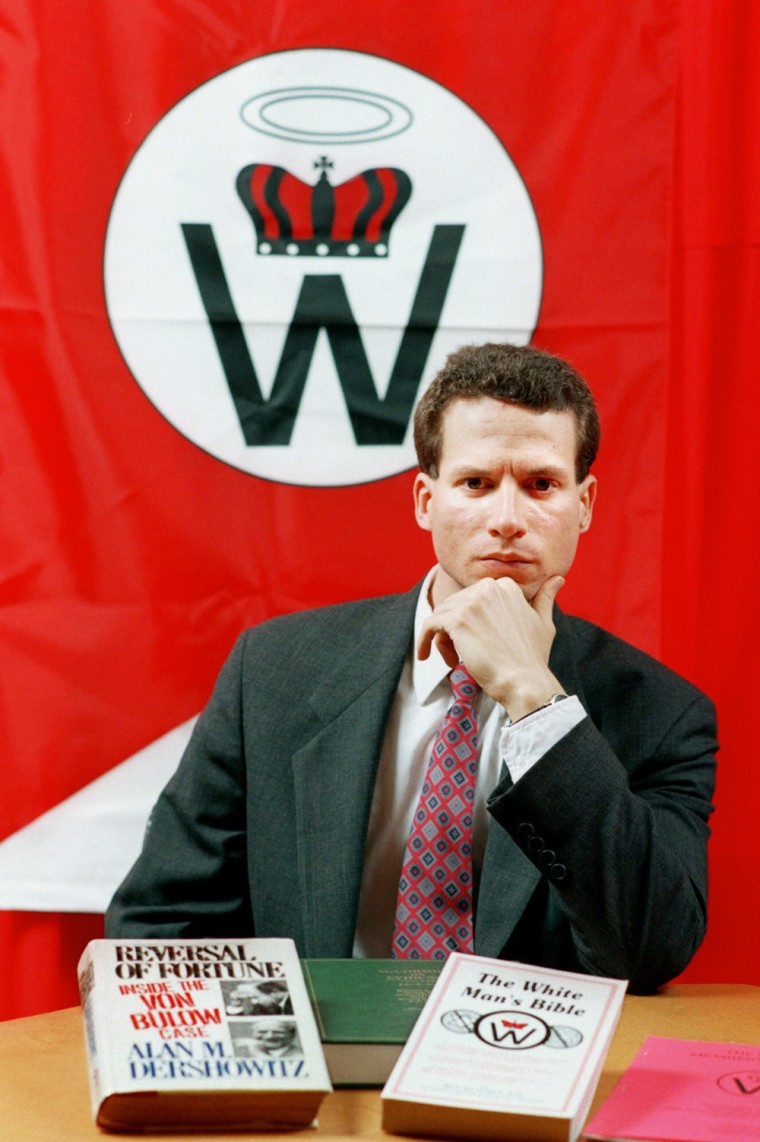White supremacist Matt Hale, the self-proclaimed “Pontifex Maximus” of the World Church of the Creator, sits in a cell, isolated from other inmates and allowed only rare visits from his parents. But investigators want to know whether his malign influence extended beyond the prison walls.
Police are investigating whether the shooting deaths of a federal judge’s husband and mother were carried out by hate groups that were linked to Hale or were sympathetic toward him and thought they were avenging his cause.
But Chicago Chief of Detectives James Molloy cautioned that the possibility of hate-group involvement is one many angles under investigation, adding: “It would be far too early to draw any definitive links.”
Hale, 33, is facing up to 40 years in prison at sentencing next month for trying to arrange the murder of the judge, Joan Humphrey Lefkow, who presided over a trademark dispute involving the name of his group. On Monday night, Lefkow came home to find her husband and mother shot to death in the basement.
Follower carried out ’99 rampage
Hale’s call for “racial holy war” was previously linked to a deadly, three-day shooting rampage against minorities by one of his followers in 1999.
White supremacist discussion forums on the Internet have been buzzing with news of the slayings this week. Some posted messages exulted over or tried to justify the killings; some complained of a “witch hunt” for white supremacists and a rush to link them to the slayings, while a few postings offered condolences to the Lefkow family.
In 2002, photos of Lefkow’s husband and daughters, as well as excerpts from Michael Lefkow’s biography, were posted on the Internet by white nationalists. In one 2003 discussion, white supremacists posted the Lefkows’ home address, noting with disbelief that it was on Michael Lefkow’s own Web site.
A Nazi acolyte at age 12
Hale grew up in the blue-collar town of East Peoria, and by his own account, he was immersing himself by age 12 in books about Nazis and formed a “Little Reich” group at school.
He ran the World Church of the Creator from his father’s house; an Israeli flag served as a doormat in Hale’s office. He drew national attention in the late 1990s when his application for an Illinois law license was denied because of his racist beliefs.
He gained wider notoriety in 1999 when a follower, Benjamin Smith, went on a shooting rampage in Illinois and Indiana. Targeting minorities, Smith killed two people, including former Northwestern University basketball coach Ricky Byrdsong, and wounded nine before killing himself as police closed in.
Tapes caught Hale laughing about shootings
Hale laughed about the rampage and imitated gunfire in secretly recorded tapes played for the jury at his trial on charges of trying to have the judge killed. The families of several of Smith’s victims sued Hale, claiming his racist rhetoric spurred Smith into action. But Hale was never charged in the shootings.
Hale’s father, retired East Peoria policeman Russell Hale, said his son could not have been involved in the killings of the judge’s family because he is under constant surveillance behind bars.
He maintains that his son was wrongfully convicted and that authorities and the media are “all trying to bury him.”
“It’s all a big sham and I feel that when his appeals come, and they will some day, this will be overturned,” his father said.
Russell Hale pointed out that Lefkow originally ruled in his son’s favor in the trademark case. But an appeals court in 2002 ruled that Hale’s group had violated an Oregon church’s trademark on the name “World Church of the Creator,” and Lefkow had to enforce the higher court’s decision in forcing Hale to change the group’s name.
“She ruled in his favor,” Russell Hale said, “so in order to get even with her he’d have to get even with three other people besides her.”
